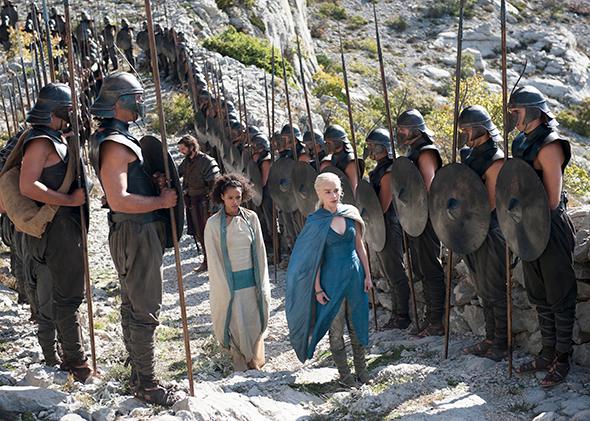If society crumbled around you, authority vanished, your neighbors became enemies, your friends mercenary, kindness a weakness, brutality a necessity, what would happen to you? Would you adapt and become a killer or would you be killed? These are the grim choices that currently present themselves to the characters in Game of Thrones, the sprawling HBO series based on George R.R. Martin’s not-at-all-fantasy novels that transforms a pre-industrial world into a post-apocalyptic story.
Holding together the fourth season, which premieres Sunday, is a baseline brutality: War sullies everyone, even us watching at home. Our standards, like those of everyone in Westeros, have been perverted. We expect a certain level of violence and moral compromise. The characters who retain a hold on our sympathy are those who can marginally control their bloodlust. The villains inspire real hate: There is no character I have wished dead more thoroughly than that sniveling sociopath Joffrey Baratheon (Jack Gleeson)—and somehow he is only Games of Thrones’ second most psychotic sadist.
As the new season begins, the civil war that has overtaken Westeros is temporarily “over” after the gruesome events of last season’s Red Wedding, but peace remains a mirage, a bit of propaganda leaking out of King’s Landing. The consequences of war hang like loose sinews over everything, waiting to be tied up. The new season is both structurally and thematically about the exponentially multiplying ramifications of violence. (One of the new characters, Oberyn Martell, shows up at King’s Landing for Joffrey’s wedding on a mission to extract revenge from the Lannisters for what they did to his sister in the last civil war. From the big picture point of view, the few decades of peace of the Baratheon era are just a blip in an ongoing dynastic struggle, the Weimar era of Westeros.)* Once peace and order are shattered, how does society, family, basic human decency get restored? The shows’ dozens of protagonists, scattered across fictional lands, have no answers.
Season 4 is based on the second half of the third book in Martin’s planned seven-book series, which is to say we are, dramatically, not even halfway there. The players and the plot are still moving out from the center. Daenerys and her increasingly large dragons are still on the other side of the world, flirting with handsome mercenaries and conquering slave societies. Jon Snow is up in the North, readying the Wall for a war with the Wildling army, which now includes cannibals. Arya and the Hound are on an ultra-violent walkabout that also provides occasional comic relief; Stannis is sacrificing people to the Lord of Light; the Lannisters sit in King’s Landing, infighting and scheming and engaging, as ever, in tawdry sexposition.
The first episode hastily re-establishes that the things that are great about Game of Thrones are the same as what is frustrating about it. Game of Thrones does world building and character creation at a level of detail unparalleled anywhere on television. (It remains an impossible show to start midway through.) Shot in multiple far-flung locations, with seemingly hundreds if not thousands of extras, it unfurls at such a scale that its characters—however high-powered—stay in perspective: They are always small, human-sized.
But due to all this ambitious sprawl, Game of Thrones only occasionally puts together a satisfying standalone episode. There is too much going on, the one-hour limit too arbitrary. Except for those episodes dedicated to one seriously traumatic event, like the Red Wedding or the Battle of Blackwater, story is always leaking out the sides. In the season opener, we are shuffled from character to character, given not enough of some, too much of others. (If I ever see Bran again before his visions finally add up to something, it will be too soon.) The ideal Game of Thrones viewing experience would be a massive, near hundred-episode binge watch when the show is finished. If you, like me, don’t have the patience for that, then week to week you put up with a show in which each episode is designed with no concern for your satisfaction.
The new season gains momentum as it goes forward, horror begetting more horror. Characters who mean well make bad choices or are punished for crimes they didn’t commit. Characters too weak to fight for themselves are used, abused, kidnapped. Characters capable of decency give into revenge, rape, mercilessness. It’s the particular power of Game of Thrones that as these characters descend further into the muck and the grime, the besmirching totality of violence, we’re still pulling for so many of them. Game of Thrones teaches us to look for even a hint of light in the darkness.
Correction, April 7, 2014: This article originally misspelled the name of Germany’s Weimar era. (Return.)
